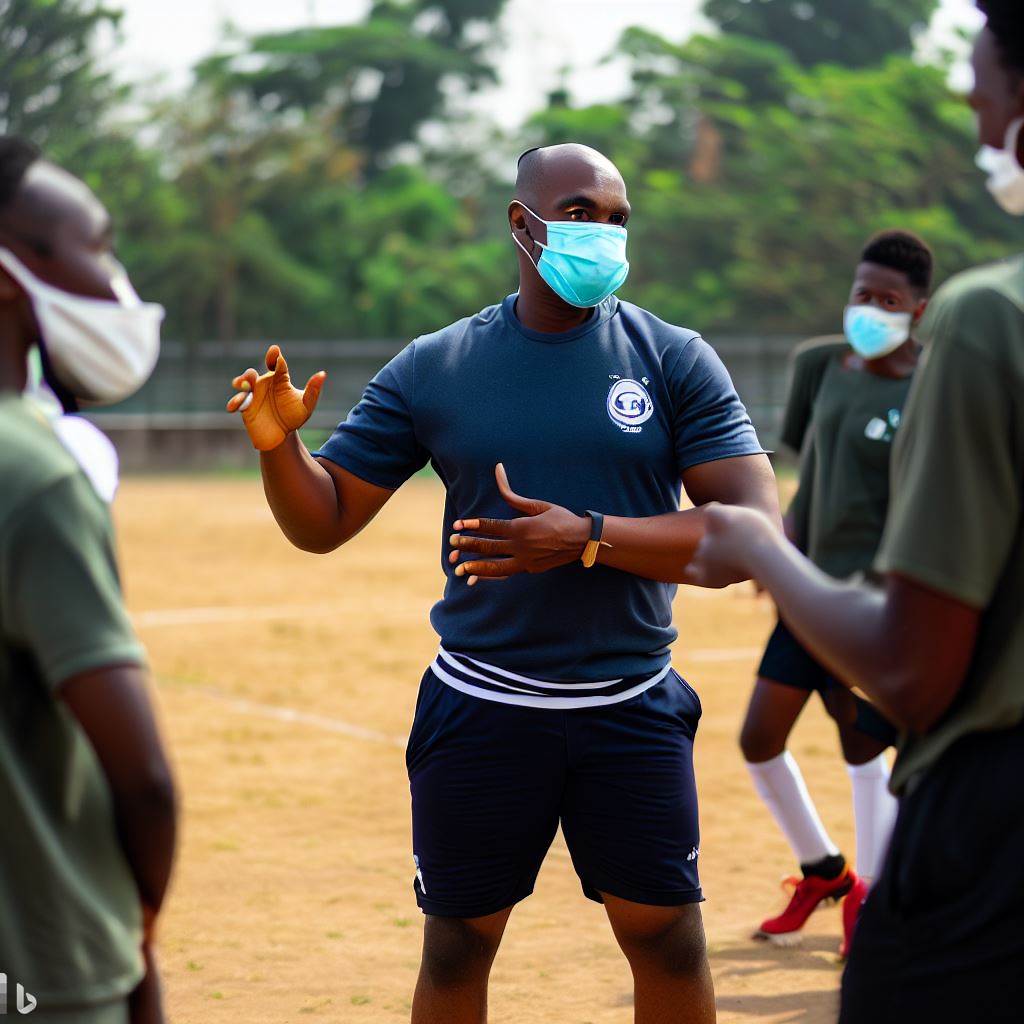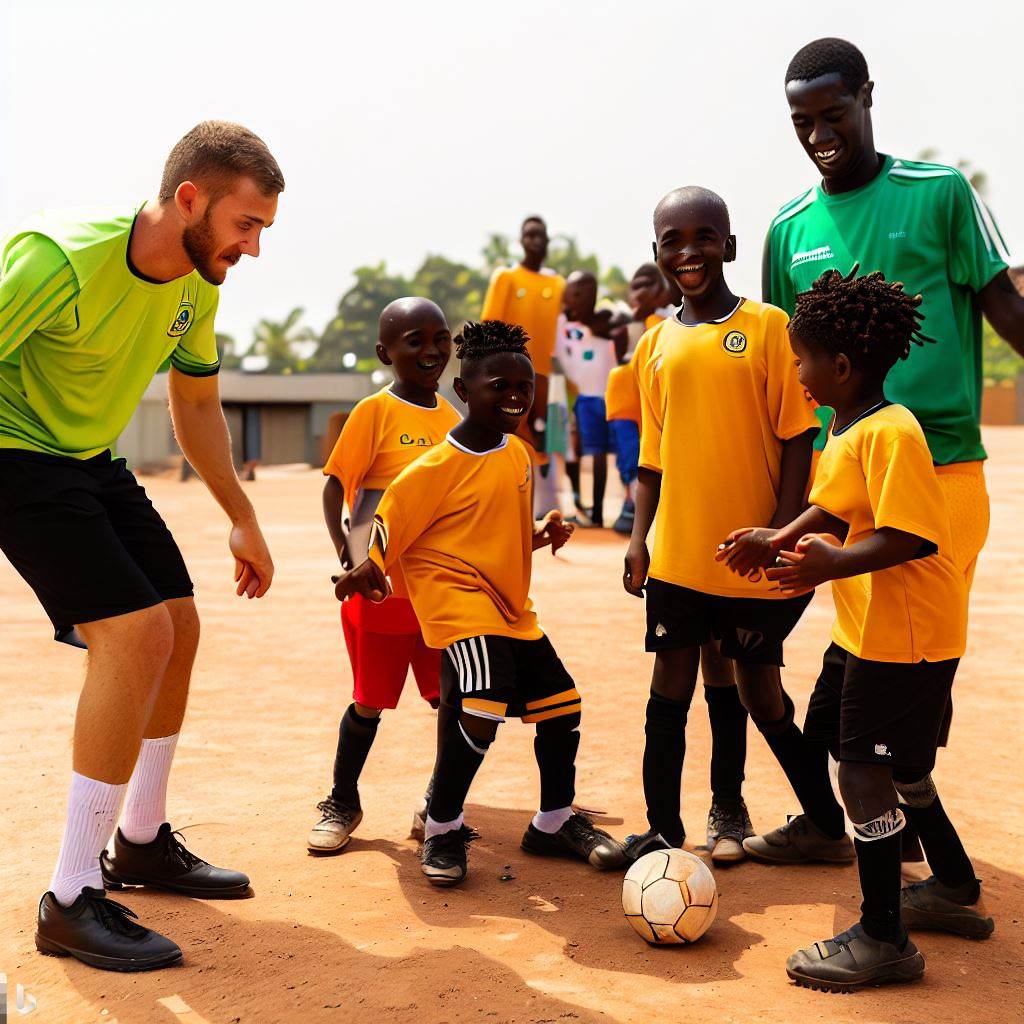Introduction
Amidst the global pandemic, Nigerian Physical Education (PE) teachers have encountered formidable challenges.
They grapple with uncertainties, navigating uncharted territories while striving to maintain the essence of PE education.
This article aims to shed light on their journey, sharing insights into their struggles and triumphs during these unprecedented times.
Challenges Faced by PE Teachers During the Pandemic
- Social Distancing: PE relies heavily on physical contact and teamwork, making it difficult to adhere to social distancing norms.
- Limited Resources: Many schools lack proper equipment and facilities to facilitate remote or socially distanced PE classes.
- Student Engagement: Keeping students motivated and engaged in physical activities from a distance presents a significant challenge.
- Health Concerns: PE teachers face heightened health risks due to the nature of their profession, necessitating strict safety protocols.
- Digital Divide: Disparities in access to technology create inequalities in delivering online PE lessons.
- Curriculum Adaptation: Adapting the PE curriculum to accommodate remote learning or smaller in-person classes is a demanding task.
The purpose of this article is to explore the innovative strategies employed by Nigerian PE teachers, sharing success stories, and offering inspiration to their peers in the global educational community.
In the context of Physical Education (PE) teaching in Nigeria, adapting to COVID-19 has posed numerous challenges. PE teachers have been confronted with unique obstacles due to the pandemic.
The Impact of COVID-19 on PE Teaching in Nigeria
COVID-19 has had a significant impact on PE teaching in Nigeria, forcing a sudden shift from in-person to remote learning.
This transition has presented numerous challenges for both students and teachers.
The Sudden Shift to Remote Learning
Before the pandemic, PE classes were conducted in person, with students actively participating in sports and physical activities.
However, with the outbreak of COVID-19 and the subsequent lockdown measures, schools were forced to move their classes online.
This sudden shift to remote learning posed several limitations for PE classes.
Firstly, students no longer had access to sports facilities and equipment, making it difficult for them to engage in physical activities.
Furthermore, the inability to interact with classmates and receive immediate feedback from teachers hindered the overall learning experience.
Limitations of Virtual PE Classes
Virtual PE classes, conducted through video conferencing platforms, could not fully replicate the hands-on experience of traditional in-person classes.
Students struggled to find suitable spaces at home to perform exercises or lacked the necessary equipment to participate effectively.
Teachers also faced challenges in adapting their teaching methods to the online environment.
It was challenging to monitor students’ progress and provide individualized feedback and guidance.
Additionally, technical issues and poor internet connectivity further hindered the seamless delivery of virtual PE classes.
Decrease in Physical Activity Levels and Consequences
The shift to remote learning resulted in a significant decrease in physical activity levels among students.
With limited opportunities to engage in sports and outdoor activities, many students became sedentary, which had negative consequences for their physical health and well-being.
Lack of physical activity can lead to increased weight gain, reduced cardiovascular fitness, and weakened muscles.
It can also negatively impact mental health, with students experiencing increased stress, anxiety, and decreased motivation.
Importance of Maintaining PE Classes
Despite the challenges posed by the pandemic, it is crucial to maintain PE classes in Nigeria.
Physical education plays a crucial role in promoting a healthy lifestyle, fostering teamwork, and teaching essential life skills such as discipline, resilience, and perseverance.
Engaging in physical activities helps students maintain their overall well-being, both physically and mentally.
It improves cardiovascular health, strengthens muscles and bones, and reduces the risk of chronic diseases such as obesity and diabetes.
PE classes also provide a platform for students to develop social skills, build self-confidence, and learn how to work together as a team.
These skills are invaluable in their personal and professional lives, promoting leadership and cooperation.
In general, the impact of COVID-19 on PE teaching in Nigeria has resulted in a sudden shift from in-person to remote learning.
However, virtual PE classes have presented limitations and challenges for both students and teachers.
The decrease in physical activity levels among students during this time is concerning and has negative consequences for their overall health and well-being.
Despite these challenges, it is crucial to maintain PE classes, as they play a vital role in promoting a healthy lifestyle and teaching essential life skills.
Read: Gender Roles in Physical Education Teaching in Nigeria
Strategies for Adapting PE Teaching to COVID-19 in Nigeria
Physical Education (PE) is an essential component of education that promotes physical fitness, health, and overall well-being.
However, the COVID-19 pandemic has posed significant challenges to PE teachers in Nigeria and around the world.
With schools closed and social distancing measures in place, PE teachers have had to come up with innovative approaches to continue providing quality education to their students.
In this section, we will discuss various strategies and teaching methods utilized by PE teachers to adapt to the new normal.
Innovative Approaches and Teaching Methods
PE teachers in Nigeria have embraced technology as a means to continue engaging their students.
One example is the utilization of online workout sessions.
Teachers have created virtual workout sessions where students can follow along at home and stay physically active.
These sessions often include a mix of aerobic exercises, strength training, and flexibility exercises.
Furthermore, virtual competitions have emerged as a way to keep students motivated and engaged.
PE teachers have organized online competitions in various sports disciplines, such as athletics, football, and basketball.
Students can participate from the safety of their homes and showcase their skills. These competitions foster healthy competition, teamwork, and a sense of accomplishment despite the physical separation.
Incorporating Theoretical and Practical Components
Virtual PE classes in Nigeria have incorporated both theoretical and practical components to ensure a holistic educational experience.
PE teachers have been creative in delivering theoretical lessons through video lectures, presentations, and interactive quizzes.
This helps students understand the concepts and importance of physical activity, nutrition, and overall health.
Additionally, practical components are incorporated through live demonstrations by the PE teachers.
They demonstrate exercises, techniques, and correct form while providing instructions and modifications based on the students’ abilities.
This interaction ensures that students not only learn theory but also have the opportunity to apply it practically.
Adapting PE Lesson Plans for Remote Learning
PE teachers in Nigeria have adapted existing lesson plans to fit the remote learning environment.
They have modified activities and exercises that can be performed at home without specialized equipment.
For example, jogging in place, bodyweight exercises, and yoga can easily be incorporated into the virtual lessons.
Teachers have also encouraged students to utilize household items creatively as substitutes for traditional sports equipment.
Using water bottles as dumbbells or a rolled-up sock as a ball are simple yet effective adaptations.
This ensures that students can actively participate in the lessons regardless of their access to sports equipment.
Adapting to COVID-19 has challenged PE teachers to think outside the box and find innovative ways to deliver quality education.
It is crucial to continue exploring new teaching methods and technologies to ensure that students receive a well-rounded PE education.
Collaboration between educators, parents, and students is key in maintaining students’ physical health and fostering their overall development.
In essence, PE teachers in Nigeria have exhibited resilience and creativity in adapting their teaching methods to the COVID-19 pandemic.
By utilizing online workout sessions, virtual competitions, incorporating theoretical and practical components, and adapting lesson plans, they have ensured that students continue to receive quality physical education remotely.
This period of adaptation provides an opportunity for the PE education sector to embrace technological advancements and explore new approaches that will benefit students in the long run.
Read: Women in Sports Broadcasting: Profiles from Nigeria
Supporting Students’ Physical and Mental Well-being during COVID-19
During the COVID-19 pandemic, it is crucial to address students’ physical and mental health.
The challenges posed by the pandemic have made it necessary for educators, especially Physical Education (PE) teachers, to step up and provide support to their students in maintaining their overall well-being.
Importance of Addressing Students’ Physical and Mental Health during the Pandemic
Students’ physical and mental health cannot be overlooked during these trying times.
The pandemic has disrupted routines and led to increased stress and anxiety among students.
Addressing their well-being is essential for their overall development.
When students are physically and mentally healthy, they are more likely to perform well academically.
Physical activities can support their mental health by reducing stress, anxiety, and depression during these challenging times. It also enhances their cognitive abilities, concentration, and overall mood.
Tips for Motivating Students to Engage in Physical Activities at Home
- Encourage students to set goals and create a schedule for physical activities at home.
- Provide a variety of fun and engaging online resources for guided workouts and fitness challenges.
- Foster a sense of competition among students by organizing virtual fitness challenges and rewarding participation.
- Share success stories of students who have excelled in maintaining their fitness routines at home.
- Collaborate with parents and guardians to ensure the availability of safe spaces for physical activities.
Role of PE Teachers in Promoting Overall Wellness and Stress Management
PE teachers play a vital role in promoting overall wellness and stress management among students. They can:
- Lead virtual fitness sessions and provide guidance on different exercises and techniques.
- Incorporate mindfulness and stress-relief activities into their virtual classes.
- Regularly check-in with students, providing a safe space for them to express their feelings and concerns.
- Encourage students to practice self-care, emphasizing the importance of rest and proper nutrition.
- Educate students about the benefits of physical activity on mental health, fostering a long-term commitment to well-being.
Resources Available for Students and Their Families for Physical and Mental Well-being
There are numerous resources available that support students and their families in maintaining physical and mental well-being:
- Online platforms offering free workout videos and fitness apps geared towards different age groups and fitness levels.
- Telehealth services providing virtual counseling sessions and mental health support.
- Mental health hotlines staffed with professionals available for immediate support and guidance.
- Community organizations and non-profits offering virtual group activities and wellness programs.
- School websites and newsletters sharing information on available resources and tips for well-being.
By actively addressing students’ physical and mental health and providing them with the necessary support, PE teachers can significantly contribute to their overall well-being during the pandemic.
It is essential to recognize that their efforts are instrumental in helping students navigate through these challenging times, ensuring a brighter and healthier future for all.
Read: Continuing Education for PE Teachers in Nigeria

Challenges Faced by PE Teachers and Potential Solutions
In Nigeria, the COVID-19 pandemic has presented numerous challenges for PE teachers in delivering effective physical education to their students.
The restrictions and limitations imposed by the virus have disrupted traditional teaching methods and created obstacles that need to be overcome.
Here, we will address some of the specific challenges faced by PE teachers in Nigeria during COVID-19 and discuss potential solutions to overcome them.
Limited access to technology
- PE teachers in Nigeria often face the challenge of limited access to technology, hindering their ability to conduct online classes or provide digital resources for their students.
- Potential Solution: Collaborating with parents can be a valuable approach. Teachers can share physical activity plans and instructional materials via messaging apps or through printed materials distributed to parents.
Lack of resources
- The scarcity of resources, such as sports equipment or facilities, poses a significant challenge to PE teachers trying to engage students in physical activities.
- Potential Solution: Teachers can utilize open spaces such as school playgrounds or nearby parks for physical activities. These spaces provide ample room for students to engage in various exercises while maintaining physical distancing protocols.
Reduced student engagement
- The shift to remote learning has resulted in reduced student engagement and active participation in PE classes.
- Potential Solution: PE teachers can create interactive and engaging virtual sessions by incorporating games, challenges, and competitions that students can participate in from home. This approach helps maintain student interest and involvement.
Limited teacher-student interaction
- The lack of face-to-face interaction between teachers and students during online classes hampers the effectiveness of teaching and individualized guidance.
- Potential Solution: Regular video conferences or phone calls can be scheduled to provide individual feedback and guidance to students. This personalized approach ensures that students receive the necessary support and motivation to stay physically active.
Psychological impact on students
- The COVID-19 pandemic has taken a toll on the mental well-being of students, affecting their motivation and overall engagement in physical activities.
- Potential Solution: PE teachers can integrate mindfulness exercises and stress-reducing techniques into their classes to help students combat anxiety and stress. This holistic approach promotes both physical and emotional well-being.
Limited time for physical education
- The condensed school day imposed by COVID-19 protocols often results in reduced time for physical education.
- Potential Solution: PE teachers can incorporate physical activities into other subjects, such as integrating movement breaks during academic classes or organizing physically active recess periods. This maximizes the limited time available for physical education.
In essence, the challenges faced by PE teachers in Nigeria during COVID-19 are significant, but they can be overcome with innovative solutions.
Collaborating with parents, utilizing open spaces, maintaining student engagement, fostering teacher-student interaction, addressing psychological impact, and maximizing limited time are all potential avenues for success.
By adapting, being creative, and leveraging available resources, PE teachers can continue to provide valuable physical education to their students, even in challenging times.
Read: A Day in the Life of a Nigerian PE Teacher: A Profile
Conclusion
Recapping the main points discussed in this article, it is evident that PE teaching in Nigeria has faced numerous challenges due to the COVID-19 pandemic.
However, adaptability, creativity, and resilience have emerged as crucial attributes for PE teachers in navigating these difficult times.
The need for adaptability cannot be emphasized enough.
PE teachers must be willing to think outside the box and explore new ways of delivering their lessons, whether through online platforms or socially-distanced activities.
This adaptability ensures that students can continue to engage with physical education, despite the limitations imposed by the pandemic.
Furthermore, creativity is key to keeping students engaged and motivated.
Publish Your Professional Profile, Business or Brand
Showcase your expertise, gain trust, and boost visibility instantly on Professions.ng.
Publish NowPE teachers should constantly seek innovative ways to deliver their curriculum and create an inclusive learning environment, even if it means using unconventional resources or modifying traditional PE activities.
Despite the challenges, PE teachers must remain resilient and determined to support their students’ physical and mental well-being.
Through perseverance, they can continue to inspire and motivate their students, providing them with a sense of normalcy and support during these uncertain times.
It is important for PE teachers to understand that these challenging circumstances also provide an opportunity for growth and learning.
By embracing adversity, they can develop new skills and strategies that will benefit their teaching practice in the long run.
In summary, while COVID-19 has brought significant challenges to PE teaching in Nigeria, it has also highlighted the importance of adaptability, creativity, and resilience.
PE teachers should remain committed to finding new ways to engage and support their students, knowing that through these efforts, they are contributing to their overall well-being and development.
Together, we can overcome these challenges and emerge stronger as a community.




